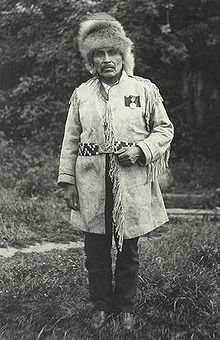Joseph Capilano
Joseph Capilano (* around 1854; † March 10, 1910 ), Su-á-pu-luck in the language of his tribe, the Squamish , was chief from 1895 to 1910 and tried to combat the policy of expropriation and forced assimilation . In 1906 he was one of the leaders of the delegation that complained to the British King Edward VII about the Canadian Indian policy.
youth
Su-á-pu-luck was born in Yekw'ts (near Squamish ) around 1854 . Letekwámcheten's son was born on a Catholic mission. When he married Mary Agnes Líxwelut on May 21, 1872, he was baptized. They had twelve children. The two lived in the North Vancouver Catholic Mission .
chief
As LAWA, the chief of the Squamish, 1895 died, the continued Oblate Father Paul Durieu that Su-á-pu-luck committed his successor was. However, part of the tribe resisted the Christian chief and moved to the Capilano reserve to the west . Su-á-pu-luck converted some of the Squamish and built a church.
Resistance to Canada's Indian policy
He soon traveled to Vancouver Island and preached there. At the same time, he increasingly resisted land expropriation and the countless legal restrictions that made hunting and fishing increasingly difficult. But the success was small. Therefore, in 1906 he decided to head a delegation - together with Basil David of the Shuswap and Chillihitza of the Okanagan - to travel to England to meet with King Edward VII and present him with a petition . The three had been selected at joint First Nations meetings . Traditionally, the leader of the delegation was given the name Capilano (in the Anglicised version), which is assigned to an outstanding leader among the Squamish and Musqueam . Therefore he became known under the name "Joe Capilano".
The delegation traveled to Ottawa , where they met Prime Minister Sir Wilfrid Laurier , and from there to London . The petition stated that the Indians' rights to their land had never been extinguished, that settlers were pushing their land without asking for permission, that demands on the Canadian government were fruitless, and that the Indian agents were the Indians - who had no right to vote - not even asked when it came directly to their business.
On his return, Capilano was enthusiastically received. Apart from the publicity, the friendly reception by the king, the handing over of the petition, he had to announce that the negotiations had to be conducted with Ottawa, not with the king. Su-á-pu-luck drew the consequence of the lack of support from the Catholic clergy that he informed them that they were no longer welcome in his area.
In 1908 Su-á-pu-luck traveled again to Ottawa, but also advertised on the Skeena River for the fact that the tribes there had to take their affairs into their own hands. The newspapers in Canada increasingly viewed him as a troublemaker and demanded that he be punished. When he died on March 10, 1910, all tribal chiefs of the Lower Mainland and Vancouver Island appeared for his funeral on the Capilano Reservation.
Web links
| personal data | |
|---|---|
| SURNAME | Capilano, Joseph |
| ALTERNATIVE NAMES | Su-á-pu-luck |
| BRIEF DESCRIPTION | Squamish chief |
| DATE OF BIRTH | around 1854 |
| DATE OF DEATH | March 10, 1910 |
